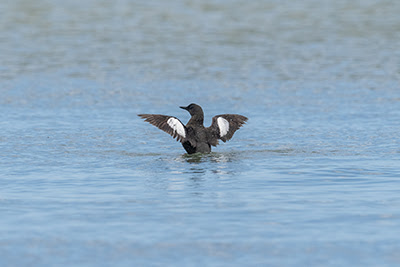It was still dark when I drove across to Hilbre Saturday morning but as soon as I arrived I could hear Goldcrests & phylosc's calling. As the sun rose over West Kirby and the tide started flooding it soon became clear it was going to be a very warm and muggy day!
There had been a small fall of migrants and I ended up catching Robins, Goldcrests and Willow Warblers and a single juvenile Common Whitethroat.
Goldcrests always look so sad when you see them head on:
Four Greenland race Wheatears spent the high tide on the west side of the island but resolutely refused to get caught.
Sunday meant another early start as I was on Hilbre again early before the hightide. Once again,there had been a small fall of migrants with Goldcrests, Robins and Chiffchaffs being dominant.
Amazingly all the Goldcrests have been females apart from this solitary male.
A skulking bird seen briefly in the bracken and brambles had our hopes raised in the expectation of a Barred Warbler (so many seem to have arrived from Scandinavia this autumn) but that expectation evaporated when the bird eventually gave itself up as a juvenile Spotted Flycatcher.
A ringed male Kestrel controlled on Hilbre a week or so ago continued its stay and spent most of its time perching on flag poles or masts and dropping on prey rather than hovering.
One of the highlights of the day was the first autumn skein of Pinkfooted Geese calling overhead as they flew west over our heads. 90 birds were counted as they flew towards Wales.
Of note on the wader front were two Sanderling roosting with Dunlin on the east side. A photographer spent the duration of the high tide on Middle Eye so subsequently no birds roosted there and many spent the duration on Hilbre. Among the thousands of Oystercatchers was a single leucistic bird that has been seen for several years around the estuary.
A great couple of unseasonably warm days.
The presence of so many berries shows the seasons are marching on and we'll soon see the last of our summer visitors and start seeing wintering thrushes and finches passing through.
22 Sept 2014
Subscribe to:
Post Comments
(
Atom
)






































































No comments :
Post a Comment